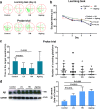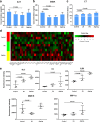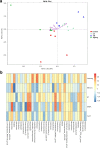Effects of chronic noise exposure on the microbiome-gut-brain axis in senescence-accelerated prone mice: implications for Alzheimer's disease
- PMID: 29933742
- PMCID: PMC6015475
- DOI: 10.1186/s12974-018-1223-4
Effects of chronic noise exposure on the microbiome-gut-brain axis in senescence-accelerated prone mice: implications for Alzheimer's disease
Abstract
Background: Chronic noise exposure is associated with neuroinflammation and gut microbiota dysregulation and increases the risk of Alzheimer's disease (AD). Environmental hazards are also thought to be associated with genetic susceptibility factors that increase AD pathogenesis. However, there is limited experimental evidence regarding the link between chronic noise stress and microbiome-gut-brain axis alterations, which may be closely related to AD development.
Methods: The aim of the present study was to systematically investigate the effects of chronic noise exposure on the microbiome-gut-brain axis in the senescence-accelerated mouse prone 8 (SAMP8) strain. We established SAMP8 mouse models to examine the consequences of noise exposure on the microbiome-gut-brain axis. Hippocampal amyloid-β (Aβ) assessment and the Morris water maze were used to evaluate AD-like changes, 16S ribosomal RNA sequencing analyses were used for intestinal flora measurements, and assessment of endothelial tight junctions and serum neurotransmitter and inflammatory mediator levels, as well as fecal microbiota transplant, was conducted to explore the underlying pathological mechanisms.
Results: Chronic noise exposure led to cognitive impairment and Aβ accumulation in young SAMP8 mice, similar to that observed in aging SAMP8 mice. Noise exposure was also associated with decreased gut microbiota diversity and compositional alterations. Axis-series studies showed that endothelial tight junction proteins were decreased in both the intestine and brain, whereas serum neurotransmitter and inflammatory mediator levels were elevated in young SAMP8 mice exposed to chronic noise, similar to the observations made in the aging group. The importance of intestinal bacteria in noise exposure-induced epithelial integrity impairment and Aβ accumulation was further confirmed through microbiota transplantation experiments. Moreover, the effects of chronic noise were generally intensity-dependent.
Conclusion: Chronic noise exposure altered the gut microbiota, accelerated age-related neurochemical and inflammatory dysregulation, and facilitated AD-like changes in the brain of SAMP8 mice.
Keywords: Alzheimer’s disease (AD); Inflammation; Microbiome-gut-brain axis; Noise; SAMP8 mouse.
Conflict of interest statement
Ethics approval
Animal treatment, husbandry, and the experimental protocols in this study were approved by the Institutional Animal Use and Care Committee of the Tianjin Institute of Environmental and Occupational Medicine.
Consent for publication
Not applicable.
Competing interests
The authors declare that they have no competing interests.
Publisher’s Note
Springer Nature remains neutral with regard to jurisdictional claims in published maps and institutional affiliations.
Figures







Similar articles
-
Environmental noise stress disturbs commensal microbiota homeostasis and induces oxi-inflammmation and AD-like neuropathology through epithelial barrier disruption in the EOAD mouse model.J Neuroinflammation. 2021 Jan 6;18(1):9. doi: 10.1186/s12974-020-02053-3. J Neuroinflammation. 2021. PMID: 33407614 Free PMC article.
-
Multi-strain probiotics ameliorate Alzheimer's-like cognitive impairment and pathological changes through the AKT/GSK-3β pathway in senescence-accelerated mouse prone 8 mice.Brain Behav Immun. 2024 Jul;119:14-27. doi: 10.1016/j.bbi.2024.03.031. Epub 2024 Mar 26. Brain Behav Immun. 2024. PMID: 38548184
-
The Effects of LW-AFC on Intestinal Microbiome in Senescence-Accelerated Mouse Prone 8 Strain, a Mouse Model of Alzheimer's Disease.J Alzheimers Dis. 2016 Jun 18;53(3):907-19. doi: 10.3233/JAD-160138. J Alzheimers Dis. 2016. PMID: 27340848
-
The Gut Microbiota and Alzheimer's Disease.J Alzheimers Dis. 2017;58(1):1-15. doi: 10.3233/JAD-161141. J Alzheimers Dis. 2017. PMID: 28372330 Review.
-
A Review of the Brain-Gut-Microbiome Axis and the Potential Role of Microbiota in Alzheimer's Disease.J Alzheimers Dis. 2020;73(3):849-865. doi: 10.3233/JAD-190872. J Alzheimers Dis. 2020. PMID: 31884474 Review.
Cited by
-
Health position paper and redox perspectives - Disease burden by transportation noise.Redox Biol. 2024 Feb;69:102995. doi: 10.1016/j.redox.2023.102995. Epub 2023 Dec 18. Redox Biol. 2024. PMID: 38142584 Free PMC article. Review.
-
Gut Microbiota, Its Role in Induction of Alzheimer's Disease Pathology, and Possible Therapeutic Interventions: Special Focus on Anthocyanins.Cells. 2020 Apr 1;9(4):853. doi: 10.3390/cells9040853. Cells. 2020. PMID: 32244729 Free PMC article. Review.
-
Association between gut microbiota and sensorineural hearing loss: a Mendelian randomization study.Front Microbiol. 2023 Oct 17;14:1230125. doi: 10.3389/fmicb.2023.1230125. eCollection 2023. Front Microbiol. 2023. PMID: 37915857 Free PMC article.
-
Nrf2 deficiency enhances oxidative stress and promotes susceptibility to tinnitus in mice.Sci Rep. 2025 May 12;15(1):16474. doi: 10.1038/s41598-025-01509-x. Sci Rep. 2025. PMID: 40355648 Free PMC article.
-
Investigating causality with fecal microbiota transplantation in rodents: applications, recommendations and pitfalls.Gut Microbes. 2021 Jan-Dec;13(1):1941711. doi: 10.1080/19490976.2021.1941711. Gut Microbes. 2021. PMID: 34328058 Free PMC article. Review.
References
MeSH terms
Substances
LinkOut - more resources
Full Text Sources
Other Literature Sources
Medical

